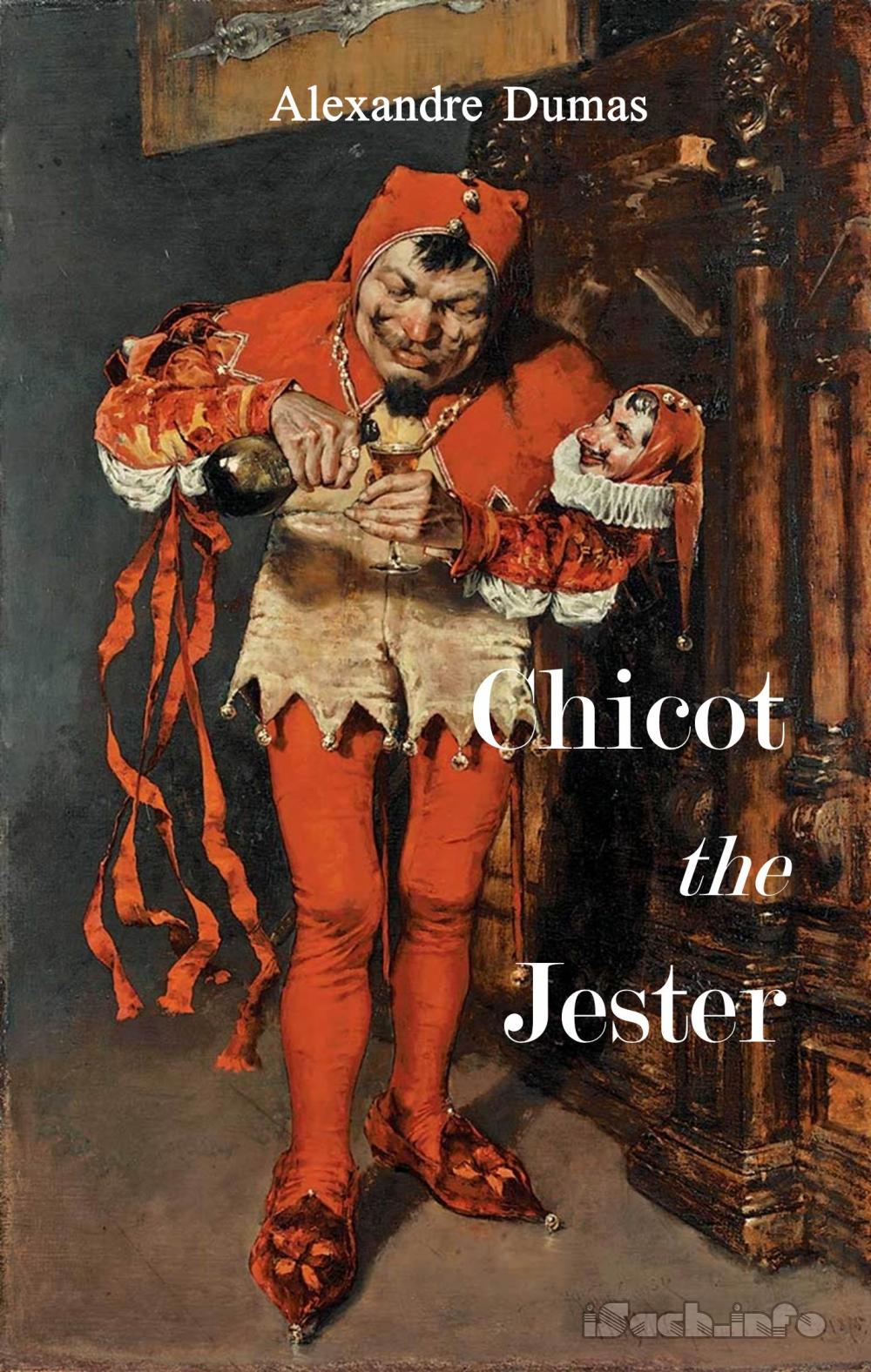Chapter 50: Eteocles And Polynices
T
his day of the League terminated brilliantly and tumultuously, as it began. The friends of the king rejoiced, the preachers proposed to canonize Brother Henri, and spoke everywhere of the great deeds of the Valois. The favorites said, "The lion is roused." The leaguers said, "The fox has discovered the snare."The three Lorraine princes, as we have seen, had left Paris, and their principal agent, M. de Monsoreau, was ready to start for Anjou. But as he was leaving the Louvre, Chicot stopped him.
"Where are you going in such a hurry?" said he.
"To his highness."
"His highness?"
"Yes, I am unquiet about him. We do not live in times when a prince ought to travel without a good escort."
"Well, if you are unquiet, so am I."
"About what?"
"About his highness also."
"Why?"
"Do you not know what they say?"
"That he has gone to Anjou."
"No; that he is dead."
"Bah!" said Monsoreau, with a tone of surprise, not unmixed with joy, "you told me he was traveling."
"Diable! they persuaded me so, but now I have good reason to think that if the poor prince be traveling, it is to another world."
"What gives you these mournful ideas?"
"He entered the Louvre yesterday, did he not?"
"Certainly; I came in with him."
"Well! he has never been seen to come out."
"From the Louvre?"
"No."
"Where is Aurilly?"
"Disappeared."
"But his people?"
"Disappeared."
"You are joking, are you not, M. Chicot?"
"Ask!"
"Whom?"
"The king."
"I cannot question his majesty."
"Oh! yes, if you go about it in the right way."
"Well," said the count. "I cannot remain in this uncertainty." And leaving Chicot, he went to the king's apartment.
"Where is the king?" he asked: "I have to render an account to him of the execution of some orders he gave me."
"With M. le Duc d'Anjou," replied the man.
"With the Duke; then he is not dead?"
"I am not so sure of that."
M. de Monsoreau was thoroughly bewildered; for if M. d'Anjou were in the Louvre, his absence on such a day was unaccountable.
Immediately after the sitting, Quelus, Maugiron, Schomberg, and D'Epernon, in spite of the ennui they experienced there, were so anxious to be disagreeable to the duke that they returned to him. He, on his part, was mortally ennuyé, as well as anxious, which, it must be confessed, the conversation of these gentlemen was not calculated to remove.
"Do you know, Quelus," said Maugiron, "that it is only now I begin to appreciate our friend Valois; really he is a great politician."
"Explain yourself," said Quelus, who was lounging on a chair.
"While he was afraid of the conspiracy, he kept it quiet; now he speaks of it openly, therefore he is no longer afraid of it."
"Well?"
"If he no longer fears it, he will punish it; you know Valois, he has certainly many good qualities, but clemency is not one of them."
"Granted."
"Then if he punishes these conspirators there will be a trial, and we shall have a fine spectacle."
"Unless, which is possible, on account of the rank of the accused, they arrange it all quietly."
"That would be my advice, certainly; it is better in family affairs."
Aurilly glanced at the prince.
"Ma foi," said Maugiron, "I know one thing; that in the king's place I would not spare the high heads, which are always the most guilty. I would make an example of one or two—one, at all events."
"I think it would be well to revive the famous invention of sacks."
"What was that?"
"A royal fancy in the year 1550; they shut up a man in a sack, in company with three or four cats, and threw them into the water. The minute the cats felt the water they attacked the man, and there passed in the sack things which unluckily could never be seen."
"Really, Quelus, you are a well of science, and your conversation is most interesting."
"They could not apply this invention to the chiefs; they have the right to be beheaded; but to the small fry, I mean the favorites, squires, and lute-players."
"Gentlemen——" stammered Aurilly.
"Do not reply to them, Aurilly," said François, "it cannot be addressed to me." As he spoke the king appeared on the threshold. The duke rose. "Sire," cried he, "I appeal against the unworthy treatment I meet with from your followers."
Henri did not seem to hear. "Good morning, Quelus," said he kissing his favorite on both cheeks; "good morning, the sight of you rejoices my soul, and you, my poor Maugiron, how are you?"
"I am terribly ennuyé, sire; when I undertook to guard your brother, I thought he was more amusing. Oh I the tiresome prince; are you sure he is the son of your father and mother?"
"Sire! you hear," cried the prince, "is it your wish that your brother should be insulted?"
"Silence, monsieur," said Henri, "I do not like my prisoners to complain."
"Prisoner, or not, I am your——"
"The title which you are about to invoke," interrupted the king, "is fatal to you. My brother guilty, is doubly guilty."
"But if he is not?"
"He is."
"Of what crime?"
"Of having displeased me."
"Sire, have our family quarrels need of witnesses?"
"You are right, monsieur. My friends, let me speak a little to my brother."
"I will take Aurilly," said Maugiron.
"Now we are alone, monsieur," said the king, when they were gone.
"I waited for this moment impatiently."
"And I also; ah, you want my crown, my worthy Eteocles; you made of the League a means, and of the throne an aim, and were consecrated in a corner of Paris, to be able to proclaim yourself to the Parisians shining with holy oil."
"Alas! your majesty will not let me speak."
"What for?—to lie, or to tell me things which I know already? But no, you would lie; for to confess what you have done, would be to confess that you merit death. You would lie, and I would spare you that shame."
"My brother, is it your intention to overwhelm me with outrages?"
"If what I say is an outrage, it is I who lie, and I ask no better. Speak then, I listen; tell me you are not disloyal, and at the same time unskilful."
"I do not know what your majesty means; you speak enigmas."
"Then I will explain my words; you have conspired against me, as formerly you conspired against my brother Charles, only then it was by the aid of Henri of Navarre, and now it is with the assistance of the Duc de Guise. It is true that formerly you crawled like a serpent; now you wish to spring like the lion; after perfidy, open force; after poison, the sword."
"Poison! what do you mean?" cried François, with flashing eyes.
"The poison with which you assassinated our brother Charles, which you destined for Henry of Navarre, your associate. That fatal poison is known; our mother has used it so often, which is doubtless the reason why you renounced it on this occasion, and preferred rather the part of captain of the League. But look me in the face, François, and learn that a man like you shall never kill me. A sword! Ah! I should like to see you here in this room alone with me, holding a sword. I have conquered you in cunning, and in a combat you would be killed. Dream no longer of struggling against me in any manner, for from this moment I act as king—as master—as despot; I shall watch you everywhere, follow you everywhere, and, at the least suspicion, I will throw you to the axe of my executioner. This is what I had to say to you in private, and I will order you to be left alone to-night to ponder over my words."
"Then, sire, for a suspicion, I have fallen into disgrace with you?"
"Say, under my justice."
"But, at least, sire, fix a term to my captivity, that I may know what to expect?"
"You will know when you hear your sentence read."
"Can I not see my mother?"
"What for? There were but three copies in the world of the famous hunting-book which killed my poor brother, and of the two others, one is in London and the other at Florence. Besides, I am not a Nimrod, like my poor brother; adieu, François."
"Gentlemen," said the king, opening the door, "the Duc d'Anjou has requested to be alone to-night to reflect on an answer he has to make to me to-morrow morning. Leave him then alone, except occasional visits of precaution. If he be troublesome, call me; I have the Bastile ready, and the governor, M. Laurent Testu, is the best man in the world to conquer ill tempers."
"Sire," cried François, trying a last effort, "remember I am your——"
"You were also the brother of Charles IX., I think."
"At least restore me to my friends."
"I deprive myself of mine to give them to you." And Henri shut the door, while the duke fell in despair into his armchair.



 ePub
ePub A4
A4